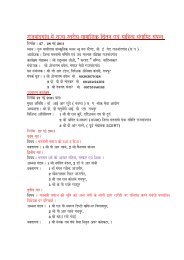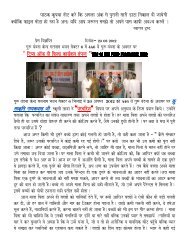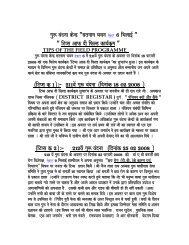Revolution and Counter-Revolution in Ancient India - Satnami.com
Revolution and Counter-Revolution in Ancient India - Satnami.com
Revolution and Counter-Revolution in Ancient India - Satnami.com
You also want an ePaper? Increase the reach of your titles
YUMPU automatically turns print PDFs into web optimized ePapers that Google loves.
The first Social Reformer <strong>and</strong> the greatest of them all is Gautama Buddha. Any<br />
history of Social Reform must beg<strong>in</strong> with him <strong>and</strong> no history of Social Reform <strong>in</strong><br />
<strong>India</strong> will be <strong>com</strong>plete which omits to take account of his great achievements.<br />
Siddhartha, surname Gautama, was born <strong>in</strong> the Sakya clan a.t Kapilvastu <strong>in</strong><br />
Northern <strong>India</strong>, on the borders of Nepal <strong>in</strong> 563 B.C. Tradition says he was a<br />
pr<strong>in</strong>ce. He received education fit for a pr<strong>in</strong>ce, was married <strong>and</strong> had a son.<br />
Oppressed by the evils <strong>and</strong> misery then prevalent <strong>in</strong> the Aryan Society he<br />
renounced the world at the age of twenty-n<strong>in</strong>e <strong>and</strong> left his home <strong>in</strong> search for<br />
truth <strong>and</strong> deliverance. He became a mendicant <strong>and</strong> studied with two<br />
dist<strong>in</strong>guished teachers, but f<strong>in</strong>d<strong>in</strong>g that their teach<strong>in</strong>gs did not satisfy him he left<br />
them <strong>and</strong> became an ascetic. He gave up that also as be<strong>in</strong>g futile. By hard<br />
th<strong>in</strong>k<strong>in</strong>g he got <strong>in</strong>sight <strong>in</strong>to th<strong>in</strong>gs <strong>and</strong> as a result of this <strong>in</strong>sight he formulated<br />
his own<br />
Dhamma. This was at the age of thirty-five. The rema<strong>in</strong>der of his eighty years<br />
he spent <strong>in</strong> spread<strong>in</strong>g his Dhamma <strong>and</strong> found<strong>in</strong>g <strong>and</strong> adm<strong>in</strong>ister<strong>in</strong>g an order of<br />
monks. He died about the year 483 B.C. at Kus<strong>in</strong>ara surrounded by his devoted<br />
followers.<br />
To the carry<strong>in</strong>g out of his mission, the Buddha devoted all his days after the<br />
achievement of enlightenment. His time was divided between feed<strong>in</strong>g the lamp<br />
of his own spiritual life by solitary meditation—just as Jesus spent hours <strong>in</strong> lonely<br />
prayer—<strong>and</strong> active preach<strong>in</strong>g to large audiences of his monks, <strong>in</strong>struct<strong>in</strong>g the<br />
more advanced <strong>in</strong> the subtle po<strong>in</strong>ts of <strong>in</strong>ner development, direct<strong>in</strong>g the affairs of<br />
the Order, rebuk<strong>in</strong>g breaches of discipl<strong>in</strong>e, confirm<strong>in</strong>g the faithful <strong>in</strong> their virtue,<br />
receiv<strong>in</strong>g deputation, carry<strong>in</strong>g on discussions with learned opponents,<br />
<strong>com</strong>fort<strong>in</strong>g the sorrowful, visit<strong>in</strong>g k<strong>in</strong>gs <strong>and</strong> peasants, Brahm<strong>in</strong>s <strong>and</strong> outcasts,<br />
rich <strong>and</strong> poor. He was a friend of publicans <strong>and</strong> s<strong>in</strong>ners, <strong>and</strong> many a public<br />
harlot, f<strong>in</strong>d<strong>in</strong>g herself understood <strong>and</strong> pitied, gave up her evil ways to take<br />
refuge <strong>in</strong> the "Blessed One". Such a life dem<strong>and</strong>ed a variety of moral qualities<br />
<strong>and</strong> social gifts, <strong>and</strong> among others a <strong>com</strong>b<strong>in</strong>ation of democratic sentiments with<br />
an aristocratic Savoir Faire which is seldom met with. In read<strong>in</strong>g the dialogues<br />
one can never forget that Gotama had the birth <strong>and</strong> upbr<strong>in</strong>g<strong>in</strong>g of an aristocrat.<br />
He converses not only with Brahm<strong>in</strong>s <strong>and</strong> pundits but with pr<strong>in</strong>ces <strong>and</strong> m<strong>in</strong>isters<br />
<strong>and</strong> k<strong>in</strong>gs on easy <strong>and</strong> equal terms. He is a good d<strong>in</strong>er-out, with a fund of<br />
anecdotes <strong>and</strong> apparently a real sense of humour, <strong>and</strong> is a wel<strong>com</strong>e quest at<br />
every house. A dist<strong>in</strong>guished Brahm<strong>in</strong> is pictured as describ<strong>in</strong>g him thus :<br />
'The venerable Gotama is well born on both sides, of pure descent..... is<br />
h<strong>and</strong>some, pleasant to look upon, <strong>in</strong>spir<strong>in</strong>g trust, gifted with great beauty of<br />
<strong>com</strong>plexion, fair <strong>in</strong> colour, f<strong>in</strong>e <strong>in</strong> presence, stately to behold, virtuous with the<br />
virtue of the Arhats, gifted with goodness <strong>and</strong> virtue <strong>and</strong> with a pleasant voice<br />
<strong>and</strong> polite address, with no passion of lust left <strong>in</strong> him nor any fickleness of m<strong>in</strong>d.



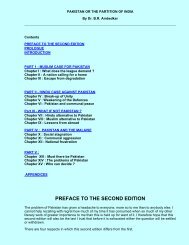

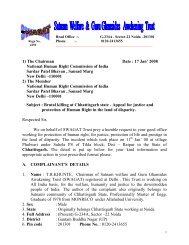
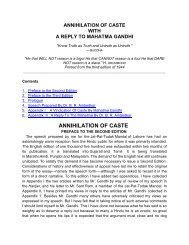
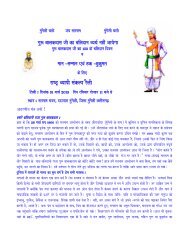
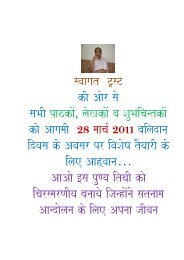
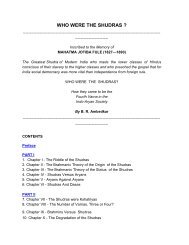

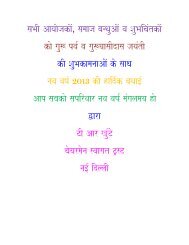
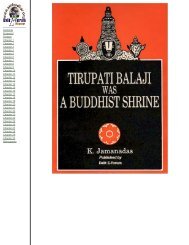
![saaQa satnaamaI saaQa satnaamaI ]%tr Baart ka mah%vapUNa ...](https://img.yumpu.com/5897453/1/190x245/saaqa-satnaamai-saaqa-satnaamai-tr-baart-ka-mahvapuna-.jpg?quality=85)
